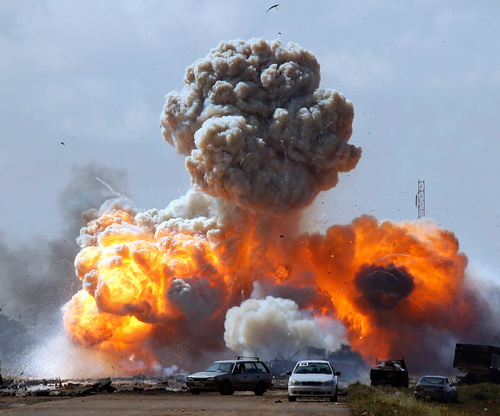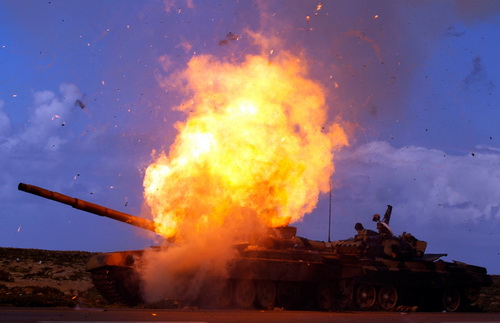Views from the East: Chinese Media on the Libyan No-fly Zone

Around the world there has been much debate over the rights and wrongs of the imposition of a no-fly zone over Libya. Below we've included translated selections from recent editorials and opinion pieces on the issue published in a variety of Chinese-language media. Newspapers in Mainland China have generally delivered scathing critiques of military action. Usurprisingly, online polls show that a majority of readers are also opposed to the military action.
An editorial published in the print edition of the Global Times (环球时报) on Mar 21 argued that the air strikes make it clear that the West is intervening in the series of uprisings that are reshaping the political landscape of the Middle East and North Africa for its own ends.
| "Whether or not the air strikes on Libya by American, British and French forces are justified will be judged by history, but one thing is clear, the ‘Middle East Revolutions’ can no longer be viewed as domestic conflicts, but must be seen as revolutions in which Western military forces have intervened in order to shape the outcome." |
The editorial goes on ask why the West is so unwilling to let
Gaddafi win the internal struggle in Libya, arguing that:
"Aside from the ‘technical reason’ that they have already declared their official diplomatic position by requesting that he step down, there appears to be an even more important cause. The West is still convinced that they manage world affairs and they believe that they cannot have their will denied by such a
small force as Gaddafi, otherwise, it would appear that the West has no power."
On March 21 the Chinese edition of the People's Daily (人民日报
Reuters published select translations from the commentary piece in a report posted to their website on the same day:
| "The blood-soaked tempests that Iraq has undergone for eight years and the unspeakable suffering of its people are a mirror and a warning." "The military attacks on Libya are, following on the Afghan and Iraq wars, the third time that some countries have launched armed action against sovereign countries." "It should be seen that every time military means are used to address crises that is a blow to the United Nations Charter and the rules of international relations." |

Zhang Guoqing (张国庆), a Beijing-based scholar, wrote a commentary that was published in the Beijing Youth Daily (北京青年报) that was also published on March 21.
The article asked why France was so willing to play such a prominent role in pressing for a military response to the Libyan crisis, while America appeared much more cautious.
The worldmeets.us website published a partial translation of the commentary. They said that Zhang's argument came down to suggesting that
"President Sarkozy was hoping to demonstrate strength to ensure reelection, and President Obama wants to shield himself from another Iraq-style embarrassment."
As Zhang Guoqing argued:
"Geopolitically and historically, Libya has genuine significance to France. Among the large Western countries, France is the closest in proximity to Libya and for many years
of the last century until Libya declared its independence in 1951, the French controlled its southern region. Certainly, oil access is also in France’s interest. Today, French oil companies have invested billions in Libya, and if France supports the coming to power of Libya’s anti-government forces, it is likely to receive greater "energy dividends" when the war is over, which will have tremendous significance for both the development of the French energy sector and energy security."
"Moreover, this will also help ease domestic conflict in France – at least Sarkozy thinks so. This also helps explain why he is so determined, even though U.S. Secretary of State Hillary Clinton told the French president that the war risks significant bloodshed. He intends to pursue his interests even if that means climbing a mountain of swords."
The website of the Singaporean Lianhe Zaobao (联合早报), a good source for relatively balanced Chinese-language reporting, reproduced on March 22 the text of an editorial that first appeared in The China Times (中国时报), one of the four most popular newspapers in Taiwan (their website appears to be blocked in Mainland China).
The thrust of the China Times editorial was that political
| "Under the leadership of NATO, the West has already begun military action against Libya. Is the motive for this latest round of international cooperation simply goodwill and humanitarian concern? Is it the desire to support democratic governance? We fear it has more to do with considerations related to international politics." "Of all the countries across the Arab region that have felt the impact of the Jasmine Revolution, it’s not surprising that countries such as Egypt and Tunisia, who have already witnessed change, support the cause of the protestors, but it does seem strange that other more established governments are willing to support the Libyan opposition to the Gaddafi regime." "America obviously is implementing a double standard when it comes to Libya and Bahrain" "Some Arab countries, such as Yemen and Algeria, are trying to focus the attention of the West on Libya in an attempt to shield themselves." |
In an opinion piece that appeared on the Chinese-language site of Caixin Media and his English-language blog, Wang Shuo (王烁), editor-in-chief of the well-respected Century Weekly Magazine and chief editor of Caixin Media, asks whether the U.S.-led military engagement in Libya is really tied to considerations about oil.
Using the example of how America allowed countries that did not takie part in the Iraq war (like China) to bid for oil contracts with the post-invasion Iraqi government, Wang argues that when it comes to energy supply, the U.S. is not attempting to win short-term gains but rather thinking about longer term stability of supply.
Wang Shuo concludes his piece by considering the consequences for China if Gaddafi remained in power:
"If the [Gaddafi] regime remains in place, the international community will impose economic sanctions, resulting in a severe hit on oil production and investment in Libya. This would be highly damaging to the interests of Chinese energy companies, harmful to global oil price stability and to the Chinese economy as a whole."
Finally, in an opinion piece published by the Economic Observer Online (经济观察网)on March 22, Li Bojun (李伯军), the director of the War and Armed Conflict Research Center at Xiangtan University's law school, argues that despite the passing of U.N. resolution 1973, the military strikes against Libya represent a violation of international law.
"The military action by Britain, France and America are inconsistent with the purposes and principles of the Charter of the United Nations, and also seriously breach the basic principles of international law which stress the non-interference in the internal affairs of other countries and prohibition of use of military force."
"In reality, intervention by any external military force can only lead to even more innocent civilian casualties in Libya, it goes against the above-mentioned United Nations resolution, further exacerbates the situation in Libya by aggravating the dispute between different tribes and factions, and may well lead the country into a chaotic civil war which could cause an even more serious humanitarian catastrophe. Therefore, the international community and Libya should do their best to use peaceful methods in order to ease tensions and find a lasting solution to Libya’s internal problems."
Links and Sources
Image: Reuters
Global Times: 社评:空袭是西方要主导世界的宣示 (Chinese)
People's Daily Commentary: 不要放弃用和平手段解决危机的努力 (Chinese)
Reuters: China intensifies condemnation of Libya air strikes
Beijing Youth Daily: 为什么这次是 “法国牵头美国断后”? (Chinese)
Worldmeets.us: Why in Libya, Americans are ‘Bringing Up the French Rear’
Lianhe Zaobao: 中国时报社论-攻击利比亚 政治考量多于人道 (Chinese)
Caixin: Military Strikes on Libya [Chinese] [English]
Economic Observer Online: 多国部队军事打击利比亚有违国际法 (Chinese)
Economic Observer Online: China Poll: What do People Think of the Military Action in Libya?
The views posted here belong to the commentor, and are not representative of the Economic Observer |
Related Stories
Popular

- Japan Earthquake:To Stay or to Go?
- Tourists are leaving, and the trend spread to longer-term residents of the country.
Interactive
Multimedia

- EEO.COM.CN The Economic Observer Online
- Bldg 7A, Xinghua Dongli, Dongcheng District
- Beijing 100013
- Phone: +86 (10) 6420 9024
- Copyright The Economic Observer Online 2001-2011
















